Module1学案
外研社英语七年级下册Module1读写课学案

Module 1 读写课学案学习目标:1、能读懂对正在发生的事情的描述。
2、学会写明信片。
3、学会描述自己或他人正在做的事情;用and连接句子。
学习难点:学会写明信片;学会描述自己或他人正在做的事情;用and连接句子学习过程:一、自主学习:自己学习a1文章结合地图找出描述的地方。
二、互助探讨:a2、a3、a4三、黑板展示:展示互助探讨中的a4四、精讲点拨:讲解a5明信片的书写五、达标测试:(一)、用动词的适当形式填空:1、---Where is your brother?---He is there. He (mend) hiscar.2、Listen !Some birds (sing) in the tree.3、My mother usually (buy)things on Sunday.4、The little girls enjoys (draw).5、Thank you for (come) to my party.6、Please (wash) the clothes for her.7、He is walking to pubs and (have) a drink.8、“What are you doing? ”“I (write)a postcard.”(二)、根据汉语完成句子。
1、---What is David doing in his room?---He (在穿足球袜)2、人们没有穿衣打扮。
People aren’t .3、我们正享受阳光。
We .4、老师站在全班同学的前面。
The teacher is the class.5、他们正在等公共汽车。
They bus.6、(世界不同地方的人们)are doing different things.六、拓展提升:给你的朋友写一张明信片描述你正在干的事情。
八年级下外研版MODULE1学案

初二下Module 1 Hobbies学案预习学案一预习目标:1.预习并掌握以下单词collect, collection, tidy, tidy up, doll, fan, stamp, untidy, least, take up, all the time, be interested in, interview其他词组:Tidy up Take up Be interested in Give an interview to sb Train tickets All the time Play the violinAt the end of Radio Beijing Have a collection ofSenior high school In the future Teenage lifeCome out Professional writer Mountain bikingUsual activities a writing workshop As well asA summer camp bring sb enjoyment in life2. 通过谈论兴趣与爱好训练学生的听、说、读、写能力,掌握使用简单句表达兴趣爱好以及对兴趣爱好的简单评析。
3.辨别多种爱好,二预习重点:1.重点词组的用法:as well as, such as, as a result的用法。
2 能介绍自己的爱好,介绍他人爱好。
三预习方法:自主互助讨论法,教师指导法。
四预习提纲:1 自主根据音标拼读单词, 注意词性及读音,小组内部讨论互相正音。
2 教师播放录音,纠正个别单词发音,小组合作互相督促记住单词。
3. 自主预习好词组并且填空练习。
1.____a player, I’m looking forward _____the 2008 Olympic Games.A For, atB AS ,toC With, forD Of ,to2.____ a result, he became a famous singer.A AsB ToC WithD By3. My hobby is ______.A collect dollsB collecting dollsC collection dollsD collected dolls.3. what happened _____ your computer ?A inB toC withD As4.I like piano. I play the piano______.A all the timeB all the timesC some timeD sometime5.there is no _____ for me to stand. A a room B a space C any space D room6.Tom as well as his sister ______going to visit shanghai next month.A isB areC willD can7.if you want to pass the exam ,you need _____harder.A worksB worksC to workD working8.have you any of your hobbies brought you _____?A enjoyB enjoysC to enjoyD enjoyment9.what makes you _____ he is a teacher ?A thinkB thinkingC thinksD to thin k10. I often listen to him ______ the violin.A. playB. playsC. playingD. to play初二下Module 2 Hobbies语法课学案语法课: 1. Read through the examples with the Ss.2. Classify the sentences(1). sb be(2). There be(3). Sb + V + sth.(4). sb + V .(5). sb + V + sb +sth/ sb + V + sth to sb.(6). sb + V + sb to do sth3. Ask the Ss to put the words and phrases in the correct order according to thesentence patterns given above individually.4. Check the answers with them.5. Make sure the part of speech in each sentence.(1). sb be …S + V + P(2). There be + n. + prep phraseThere be + S + adverbial(3). sb does sth.S + V + O(4). sb does.S + V(5). sb does sb sth / sb does sth to sb.S + V + IO + DO(6). sb does sb to do sthS + V + O + OC6. Write similar sentences with the models of Activity 2.(1). Read the sentences first and make sure which sentence patterns each belongsto.(2). Write similar sentences.(3). Share in pairs and ask some to present the sentences on the Bb.采用归类比较的方法,使学生更加明了的掌握句子的不同成份。
Module-1-How-to-learn-English学案
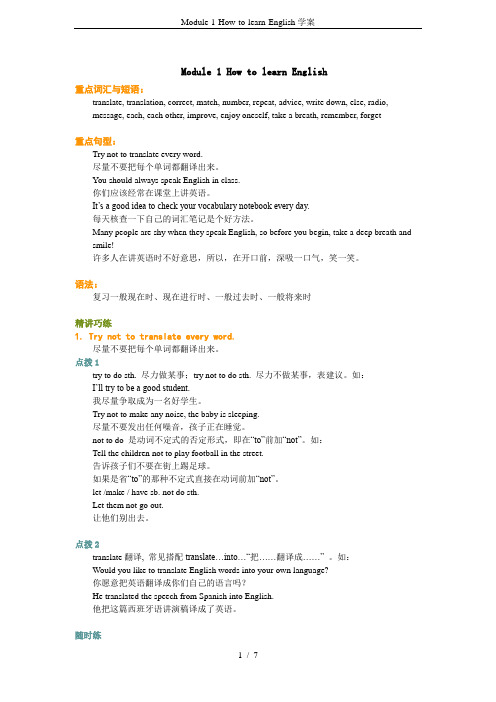
Module 1 How to learn English重点词汇与短语:translate, translation, correct, match, number, repeat, advice, write down, else, radio,message, each, each other, improve, enjoy oneself, take a breath, remember, forget重点句型:Try not to translate every word.尽量不要把每个单词都翻译出来。
You should always speak English in class.你们应该经常在课堂上讲英语。
It’s a good idea to check your vocabulary notebook every day.每天核查一下自己的词汇笔记是个好方法。
Many people are shy when they speak English, so before you begin, take a deep breath and smile!许多人在讲英语时不好意思,所以,在开口前,深吸一口气,笑一笑。
语法:复习一般现在时、现在进行时、一般过去时、一般将来时精讲巧练1. Try not to translate every word.尽量不要把每个单词都翻译出来。
点拨1try to do sth. 尽力做某事;try not to do sth. 尽力不做某事,表建议。
如:I’ll try to be a good student.我尽量争取成为一名好学生。
Try not to make any noise, the baby is sleeping.尽量不要发出任何噪音,孩子正在睡觉。
not to do 是动词不定式的否定形式,即在“to”前加“not”。
如:Tell the children not to play football in the street.告诉孩子们不要在街上踢足球。
2022年外研版九下《Module 1 Unit 2》精品学案

Module 1 TravelUnit 2 It’s a long story.〔一〕重点单词1. sir n. 先生;长官sir的根本意思是“先生〞, 是对男士的一种尊称, 多用于长者、上级或效劳业中对男顾客的称呼. sir不可同姓氏连用, 但可用于名字之前或名字与姓之前. sir通常用于正式书信的开头, 如Dear Sir或Sirs, 首字母要大写.sir的另一意思是“爵士〞.如:I am sorry, sir, you are five kilo overweight. 对不起, 先生, 您的行李超重5公斤.“Both, sir!〞cried the Swede proudly.“两个都, 长官! 〞瑞典人自豪地大声说.“Good night, Sir John,〞said the parson.“晚上好, 约翰爵士. 〞牧师说.2. officer n. 军官;官员;警察officer的根本意思是“军官;警官〞, 在现代英语中也指穿特殊制服的工作人员〔如海关官员等〕. officer还可在其前面加具体的部门或负责事项,作“公司高级职员、政府机关的官员〞解. 如:He’s not an officer, but a common soldier. 他不是军官而是普通士兵.His father is a customs officer. 他父亲是一位海关官员.He’s heavily horsed by the officer.他被上级长官狠狠鞭打了一顿.〔二〕常考短语1. take care 留神;小心;保重2. take off 脱去3. look for 寻找4. have a look at 看一看〔三〕核心句型1. And so am I! 我也是〔去北京〕!在这个句型中, so常用来代替上文中的形容词、名词或动名词, 表示赞同.“So+be动词〔助动词、情态动词〕+主语〞结构用以承接前一句的内容, 表示“〔甲如此〕, 乙也如此〞. be 动词、助动词、情态动词要和前一句的谓语动词保持一致. 如:He can swim, and so can I.他会游泳, 我也会.【注意】“So+谓语+主语〞与“So+主语+谓语〞的区别〔1〕当两个句子指的是两个人时, So后句子要倒装. 如:He is a student. So am I.他是个学生. 我也是.〔2〕当两个句子指的是同一个人时, So后句子不倒装. 如:— Lucy likes dark blue.露西喜欢深蓝色.— So she does.是的. (她是喜欢深蓝色)2. Now, take off your jacket. 现在把外套脱掉吧.〔1〕take off作为“脱下〞讲, 反义词为put on. 如:Put on your clothes. Don’t take them off. 把衣服穿上, 别把衣服脱下.I took off my overcoat since it was warm.天气很暖和, 我就把大衣脱了.〔2〕take off意为“起飞〞. 如:When will the plane take off? 飞机何时起飞?What was the girl doing when the UFO took off? 当飞碟起飞时, 女孩在干什么?Ⅰ. 根据首字母或汉语提示, 完成句子.1. The o ordered his men to fire at the enemy.2. From Beijing to Guangzhou is a long j .3. My home isn’t very big, but very c .4. Would you like to try this j (夹克) on for size, sir?Ⅱ.单项填空.( ) 1. I was so tired this morning that I couldn’t ______ early as usual.A. get upB. get onC. get off( ) 2. —What are you doing?—I’m the key to the door.A. finding outB. looking afterC. looking for( ) 3. John had a short walk after lunch, ______?A. did heB. didn’t heC. had he( ) 4. —Excuse me. Can I take a seat here?—______. The woman who sat here will be back soon.A. We’d better not.B. No, thank you.C. I’m afraid you can’t.( ) 5.—I hope the summer vacation will come soon.—_______.It’s really relaxing.A. So do IB. So I doC. So did IⅢ.根据所给汉语完成以下句子, 每空一词.1. 你真好,来帮助我们.It ______ ______ ______ you to help us.2. 他大了, 能照顾自己了.He's old enough to ______ ______ ______ himself.3. 无论多热,他也不会脱掉外衣.However hot it is, he will not ______ ______ his coat.4. 让我们瞧一瞧你们的电子机算机.Let's ______ ______ ______ your electronic computer.5. 她上了公车, 找了个最前面的座位.She ______ ______ the bus and picked a seat up front.Ⅳ.阅读理解.While travelling, you’ll be taking money, license or passport. Or you will buy something expensive to take back home with you and you don’t want it to get stolen. Here are some ideas on how to keep your valuables(贵重物品) safe while traveling.Plan ahead of timeThink of what you really need and don’t need to take on your trip. Only take the valuables that you must have, not just ones that you would like to have.Carry your valuables on your personSomething that is small, like cash and credit cards and your passport, can be carried in a money wallet around your neck or in a money belt. This way, your valuables are hidden and right next to you, where you know where they are at all times. Wear clothing that can hide the money belt.Carry larger valuables in your carry-on bagIf you can’t fit it in your money wallet like some large valuables, you’d better put them somewhere that you will keep touch with them. Your can put them on the plane, so you don’t have to worry about the airline losing your bag or someone stealing it from the belt after the flight before you get to it.Choose a hotel that has the front desk for valuablesThis way, you don’t have to worry about housekeeping getting hold of your valuables, or someone stealing your valuables if your room is broken into. If you give the valuables to the front desk to keep for you, choose a time when others are not looking.( ) 1. The passage is mainly about ______.A. what to do while travelingB. how to carry your valuables on your personC. how to keep your valuables safe while traveling( ) 2. You can carry all of the following valuables on your person EXCEPT ______.A. your cashB. credit cardsC. your large valuables( )3.Which kind of hotel can you choose while traveling according to the text?A. You can choose a hotel with a lot of housekeepers for valuables.B. You can choose a hotel with the front desk for valuables.C. You can choose some cheap hotel.( ) 4.When you plan your travel ahead of time, you should make sure that ____.A. you take valuables that you must haveB. you take valuables as many as possibleC. you take valuables that you would like to have( ) 5. Which of the following is TRUE according to the text?A. Anything small must be carried in a money wallet around your neck.B. You give valuables to the front desk at a hotel when others are looking.C. You’d better put some large valuables in your carry-on bag.〔一〕重点单词1. stupid adj. 笨的;糊涂的stupid主要指缺乏理智, 指先天迟钝、智力低下, 也可指因醉酒或疾病而导致头脑麻木. 在句中可用作定语, 也可用作表语.stupid用作表语时, 如主语是动词不定式, 那么通常用形式主语it结构, 该动词不定式的逻辑主体由介词of引出. 如:He is so stupid that he can't so much as eat. 他蠢得甚至连吃饭都不会.I'll have none of your stupid ideas!我决不同意你的愚蠢想法.It is stupid of him to make the same mistake twice. 他真实傻瓜, 两次犯同样的错误.〔二〕常考短语1. too…to… 太…而不能…2. ask for 请求;要求3. get off 下车4. say goodbye to和…说再见5. sit down 坐下〔三〕核心句型1. Li Lin says goodbye to his brother Li Wei. 李林向他哥哥说再见.say“说〞, 是及物动词必须带宾语, 强调说话的内容.Did he say anything? 他说什么事情了吗?I want to say nothing but sorry. 我只想说对不起.I'd like to say goodbye to you all. 我想向你们大家辞别了.say构成的短语有:say a few words 说几句话say goodbye to 和……说再见say hello to 向……表示问候Ⅰ.根据句意及所给汉语提示完成句子, 每空词数不限.1. However hot it is, he will not (脱掉) his coat.2. You must (小心) not to hurt yourself.3. Mr. john, will you like to (看一看) our showroom?4. You can (寻找) the book in the library catalog.5. It (非常好) you to give me the book.Ⅱ.口语运用.A: Hi, you’re traveling here, aren’t you?B: Yes, I am. (1)A: I’m traveling here, too. When did you arrive?B: (2)A: I’ve just arrived. (3)B: Yes. I enjoyed it very much.A: How long will you stay here?B: (4) Then I’ll go to France and England.A: Oh, that’s great! I’ll go there, too. Can I go with you?Ⅲ.阅读短文, 根据短文内容和首字母提示写出文中所缺单词.A young man was traveling. It was getting late in the day, and he was t 1 . When he met an old man on the road, he asked him, “Excuse me, wher e can I get w 2 , sir? 〞The old man told him, “Walk along the road and you’ll see a small r 3 .〞Then the old man added, “If you pick up some pebbles(卵石;小圆石) from the river bed, you will get both glad and s 4 .〞The young man t 5 the old man and went on his way. When it got dark, he found the river and took a d 6 . He thought it was silly to pick up pebbles, b 7 he still picked some up. He then found a p 8 to sleep.The next morning the young man found those pebbles became beautiful, bright jewels (珠宝). So he ran back to the river q 9 to get more, but there were only sands.Looking at the beautiful jewels, he felt s 10 that he hadn’t picked up more. At that time he was happy that he had picked some up.1. 2. 3. 4. 5.6. 7. 8. 9. 10.Unit 3 Language in useTeaching aims:1.Master all the new words and phrases.2.Master all the new language points and sentences.一、用括号内所给形容词的适当形式填空1. The street is as _________(long)as that one.2. Mike is ___________(thin) than his brother.3.The Nanjing Road is the _______________(crowd)street in Shanghai.4. The library of this school has ___________(many )novels than those of the other school.5. Math is not so _______________(interesting)as history.6. My __________(old)sister is two years_______(old)than I.7. We’ll try our best to do the work with _______(little )money and ________(few) people.8. Cathy did quite ___________ in English competition, and I did even _________(well).二、单项选择1. Beijing is becoming _________ and __________.A. more beautiful; moreB. beautiful; beautifulC. more; more beautifulD. more beautiful; more beautiful2. ________ children there are in a family , ________ their life will be.A.The less; the betterB. The fewer; the betterC. Fewer; richerD. More; poorer3. ________, he was given a good job.A. becauseB. as a resultC. because ofD. as a result of4. She was late _______ the heavy traffic.A. becauseB. as a resultC. because ofD. as a result of5. It’s _________ to listen to light music when you feel tired.A. dangerousB. scaryC. relaxingD. difficult6. – How many girls are there in your class?-- _______them ________over twenty.A. A number of ; areB. The number of; areC. A number of; isD. The number of; is7.—Some children can’t afford ________ necessary stationary.--- Let’s donate our pocket money to them.A. buyB. buyingC. to buyD. to bought三、翻译句子1.人们砍伐了太多的树木, 结果环境恶化了.People cut down too many trees. ___________ __________ ___________ the environment is getting worse. 2. 最近我们听到了很多有关那位年轻演员的事.We have ___________ a lot _____________ the young actor recently.3. 看到我的家乡发生了很大的变化, 我很满意.I ____________ very _________ ____________ ___________ that great changes have taken place in my hometown.4. 你应该在外面玩而不应该在屋里工作.You should be out playing ___________ ___________ working indoors.5. 当他到达火车站的时候, 火车已经开了.________ __________ __________ he got to the train station, the train had left.四、任务型阅读As we know, everyone can make mistakes, but don't worry about it. The following is what we should do when we make mistakes.Firstly, just admit (成认) it. Don't think that our mistakes are caused by others. Be brave and face the fact thatwe have made the mistakes. Don't blame other people, and don't cheat (欺骗) ourselves, either. (1) After we make mistakes, we can prevent them disturbing us by laughing at ourselves.Secondly, (2)_________ _________at once. In order to stop the problem from getting worse, we should act quickly to solve it. If we don't act and deal with the problem quickly, it'll only make us feel more stressed. Also it is necessary to make a plan of action and correct the mistake according to it. So decide quickly and act!Thirdly, realize that making mistakes is the best way to learn. Those who have made the most mistakes can get an A, for they are the ones who have learned the most. The more we learn from our mistakes, the cleverer we are. And lastly, think about what we can learn from our mistakes. What caused us to make the mistake? How can we avoid〔防止〕making the same mistake in the future? When we act with a method〔方法〕to get a good result, do it that way next time. If we don't, we should stop, think about it, change it and try again. (2021 泰州)1.把(1)句译成中文._______________________________________________________________2.在(2)句的空白处分别填入一个适当的词使句意完整、上下文通顺._______________________________________________________________3.答复以下问题:What should we do if we don't get a good result with a method?_______________________________________________________________4.在文中找出与If we learn more from our mistakes, we will become cleverer.意思相近的句子.________________________________________________________________5.在文中找出最能表达该短文主题的句子, 并将它写在答题卡上.___________________________________________________________________。
外研版英语七下学案: Module 1 Unit 1《Whose bag is this》
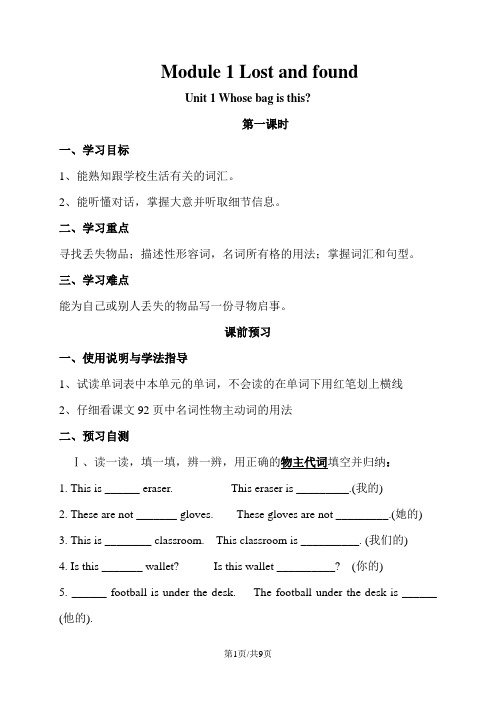
Module 1 Lost and foundUnit 1 Whose bag is this?第一课时一、学习目标1、能熟知跟学校生活有关的词汇。
2、能听懂对话,掌握大意并听取细节信息。
二、学习重点寻找丢失物品;描述性形容词,名词所有格的用法;掌握词汇和句型。
三、学习难点能为自己或别人丢失的物品写一份寻物启事。
课前预习一、使用说明与学法指导1、试读单词表中本单元的单词,不会读的在单词下用红笔划上横线2、仔细看课文92页中名词性物主动词的用法二、预习自测Ⅰ、读一读,填一填,辨一辨,用正确的物主代词填空并归纳:1. This is ______ eraser. This eraser is _________.(我的)2. These are not _______ gloves. These gloves are not _________.(她的)3. This is ________ classroom. This classroom is __________. (我们的)4. Is this _______ wallet? Is this wallet __________? (你的)5. ______ football is under the desk. The football under the desk is ______ (他的).6. _______ eyes are blue (它的)。
7. These are __________ bags. These bags are ________________. (他们的)8. These are ___________crayons. These crayons are ____________. (Betty的)Ⅱ、匹配:Match the words from Box A with the words from Box B.A:B:三、我的疑惑:________________________________________________________课内探究Step 1. Free talkHave some students to talk something about colors.Step 2. Pre-task.Tell the students to place their school bags on their desks. Tell them to look inside their bags. Get some of the students to describe to the class the things they have in their bags.Step 3. WriteAsk students to look at the picture and tell you what they can see, then ask students to read the Los Property form. Tell them to use the words around the picture to complete Hu Shan’s Lost Property for m. Then write the Lost Property Form on the board and ask students to come up and fill in the blanks.Step 4. Activities1. Ask students imagine that they have lost their pencil case /school bag. Look at the table, to write down at least 5 things that are in their bags on page 64.Tell students to write their own Lost Property form, using accrual facts about their own pencil case/school bag.2. Tell students that Paul has lost his dog. Help him to write a ‘Lost Dog’ note. Tell some words about Paul’s dog.(Work in groups.)Step 5. Show time,Get students to read their Lost Property in the class.当堂检测Ⅰ、根据汉语意思,完成句子1. 欢迎回到学校。
MODULE1语法课专项复习学案
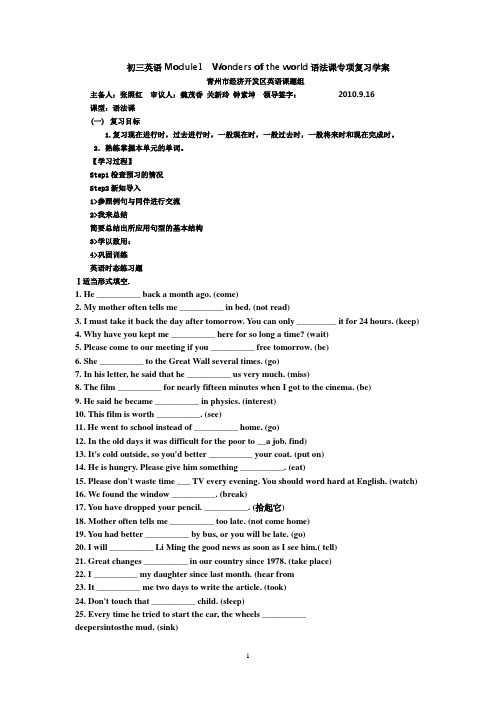
初三英语Module1 Wonders of the world语法课专项复习学案青州市经济开发区英语课题组主备人:张照红审议人:魏茂香关新玲钟素坤领导签字: 2010.9.16课型:语法课(一)复习目标1.复习现在进行时,过去进行时,一般现在时,一般过去时,一般将来时和现在完成时。
2.熟练掌握本单元的单词。
【学习过程】Step1检查预习的情况Step2新知导入1>参照例句与同伴进行交流2>我来总结简要总结出所应用句型的基本结构3>学以致用:4>巩固训练英语时态练习题Ⅰ适当形式填空.1. He __________ back a month ago. (come)2. My mother often tells me __________ in bed. (not read)3. I must take it back the day after tomorrow. Y ou can only _________ it for 24 hours. (keep)4. Why have you kept me __________ here for so long a time? (wait)5. Please come to our meeting if you __________ free tomorrow. (be)6. She __________ to the Great Wall several times. (go)7. In his letter, he said that he __________ us very much. (miss)8. The film __________ for nearly fifteen minutes when I got to the cinema. (be)9. He said he became __________ in physics. (interest)10. This film is worth __________. (see)11. He went to school instead of __________ home. (go)12. In the old days it was difficult for the poor to __a job. find)13. It's cold outside, so you'd better __________ your coat. (put on)14. He is hungry. Please give him something __________. (eat)15. Please don't waste time ___ TV every evening. Y ou should word hard at English. (watch)16. W e found the window __________. (break)17. Y ou have dropped your pencil. __________. (拾起它)18. Mother often tells me __________ too late. (not come home)19. Y ou had better __________ by bus, or you will be late. (go)20. I will __________ Li Ming the good news as soon as I see him.( tell)21. Great changes __________ in our country since 1978. (take place)22. I __________ my daughter since last month. (hear from23. It __________ me two days to write the article. (took)24. Don't touch that __________ child. (sleep)25. Every time he tried to start the car, the wheels __________deepersintosthe mud. (sink)26. When I got home, I found that my room __________ breaksintosand a lot of things__________. (steal)27. If I had arrived there earlier, I __________ him. (meet)28. I didn't remember __________ her the book before. (give)29. He called at every door, __________ people the exciting news. (tell)30. Y esterday Mary couldn't finish her homework, so she has to go on__________ it this afternoon. (do)31. W e __________ football when it began to rain. We had to stop and go home. (play)32. Xiao Lin __________ from here for about two hours. (be away) 33.swheres__________? Can you find your birth place on the map?Sorry, I can't. (be born)34. Last night we ______ back home until the teacher left school. (not go)35. Comrade Li Dazhao __________ in prison in 1927. (put)36. Where is professor Lee?He __________ to the library. He'll come back soon. (go)37. W e could not help __________ after we heard the story. (laugh)38. Would you please __________ me an English-Chinese dictionary when you come? (bring)39. He told me that he __________ the Great Wall the year before. (visit) 40. I'll tell him the news as soon as he __________ back. (come)41. The boy __________ by the door is my brother. (stand)42. Do you remember __________ the film last year? (see)43. There __________ a physics test next Monday. (be)44. __________ I finish my homework in class? (必须)No, you needn't.45. I'm sorry you've missed the last bus. It __ten minutes ago. (leave)46. W ei Fang is heard __________ English every morning. (hear)47. John stopped __________ a rest (have) because he __________ for three hours. (work)48. I'm sorry to have kept you __________. (wait)49. A new theatre __________ now. (build)50. The boys __________ basketball on the playground are my classmates. (play)51. I regretted answering like that, I was sorry __________ so. (do)52. Can't you see I'm busy __________? (cook)53. He __________ worried when coming into the teacher's office. (look)54. __________ come beef! (随便吃点)55. It's a great shame for me _____in front of so many people.(laugh at)56.Look!That man__(open)the door of your car.57.T.he moon__(go)round the earth. 58.I must go now.It__(get)late.59.Let's go out.It__(not/rain)now.60.Julia is vera good at languages.She_(speak)four languages very well.61.Hurry up!Everybody____(wait)for you.62."__(you/listen)to the radio?”"No,you can turn it off.”63."__(you/listen)to the radio?”"No,just occasionally.64.We usually__(grow)vegetables in our garend but this year we__(not/grow)any.65.Ron is in London at the moment.He __(stay)at the Park Hotel.He __(always/stay)there when he's in London.66.Can we stop walking soon?I__(feel)tired.67.Can you drive I__(learn).My father_(teach)me.ually I _(finish)work at 5:00,but this week I_(work)until 6:00to earn a bit more money.69.My parents__(live)in Bristol.They were bron there and have never lived anywhere else. Where__(your parents/live)?70.Sonia__(look)for a place to live.She__(stay)with her sister until she finds somewhere.71."What___(your father/do)?”"He's an engineer but I____(not/enjoy)this one very much.Ⅱ.选择题.72 According to the time table, the train for London ___ at seven o'clock in the evening.A. was leavingB. has leftC. leavesD. will leave73 Y ou should visit this part of the country when ___A. spring will comB. spring comesC. It has been springD. It will be spring74 Y ou needn't hurry her. She ___ it by the time you are ready.A. will have been finishingB. Would finishC. Will have finishedD. Will be finishing75. W e can go home when the ground ___A. is dryingB. has driedC. driedD. will dry76. Obviously, he ___ a bad cold. He sneezes so often.A. hasB. has beenC. hadD. was77. Darwin proved that natural selection ___the chief factor in thedevelopment of species.A. has beenB. had beenC. isD. was78. While Peggy ___, her brother is playing records.A. readsB. is readingC. has read D has been reading79. It's been a long time since I ___. How are you? A. had last seen you B. saw you last C. have least seen you D. last was seeing you80. W e ___ on it for several hours but we have not yet reached anyconclusion.A. workB. are workingC. have been workingD. have been worked81. He said that he ___ for Shanghai the next day.A. will leaveB. has leftC. would leaveD. had left82. This is the first time I ___ this kind of refrigerator.A. sawB. have seenC. am seeingD. see83. "As soon as I ___ home, I'll have a hot bath." He promised himself.A. gotB. will getC. have gotD. am getting84. —_____ my glasses?—Y es, I saw them on your desk a minute ago.A. Do you seeB. Have you seenC. Had you seenD. Would you see85. —Who is Clarke?—_____ him yet? I saw you shaking hands with him at the meetingA. Haven’t you metB. Hadn’t you metC. Didn’t you meetD. Don’t you meet86. I think this time yesterday he ___ an English class in No. ThreeClassroom BuildingA. hadB. will haveC. was havingD. would have87. By 2000, the university ___ 20,000 postgraduates.A. will be trainedB. trainsC. will have trainedD. would have88. I will ask her for the book now, for she ____ plenty of time to readsince I lent it to her.A. hasB. has hadC. had hadD. was having89. Our football team _____ every match so far this year, but we still have three more games to play.A. winsB. was winningC. had wonD. has won90. —Who sings best in your class?—Mary _____. A. is B. does C. do D. sing91. She _____ her pen in her room now.A. findsB. is findingC. looks forD. is looking for92. I first met Lisa three years ago. She _____ at a radio shop at that time.A. has workedB. was workingC. had been workingD. had worked93. What _____ you _____ tomorrow morning?A. are/going to doB. are/doingC. are/doneD. have/done94. I _____ as soon as you come back.A. wentB. have goneC. am goingD. shall go95. The scientist ____Canada and he will give us a talk when he _ back. A. has gone to/comesB. has been to/will comeC. has gone to/will comeD. has been to/comes96. He found his book this morning, but now he _____ his pen.A. losesB. is missingC. has lostD. lost97. She ___¬_ to her hometown several times.A. has beenB. has goneC. wentD. is going98. It _____ Jane and Mary who helped me the other day.A. isB. wasC. areD. were99. I _____ to bed when the telephone rang.A. have beenB. wentC. am goingD. was going100. Jane _____ some washing this time yesterday.A. is doingB. had doneC. was doingD. did答案1. came2. not to read3. keep4. waiting5. are6. has been7. missed8. had been on9. interested 10. seeing11. going 12. find 13. put on 14. to eat 15. watching16. broken 17. Pick it up 18. not to come home 19. go 20. tell21. have taken place 22. have heard from 23. took 24. sleeping 25. sank26. had been broken in to / stolen 27. would have met28. giving /shavingsgiven 29. telling 30. doing 31. were playing32. has been away 33. were you born 34. didn't go 35. was put36. has gone 37. laughing 38. bring 39. had visited 40. comes41. standing 42. seeing 43. is going to be 44. Must 45. left46. to read 47. to have…had worked 48. waiting 49. is being built 50.playing51. to do / to have done 52. cooking 53. looked 54. Help yourself to55. to be laughed at2. 56.opening57.goes 58.getting 59.is/isn't raining 60.speaks 61.iswaiting 62.Are you listening3. 63Are you listen 64.grows did't grow 65.is staying;stays66.amfeeling 67.?? 68.finish 69.live 70.is looking will stay 71.is do ,don'tenjoy4. (二)72.C73. B 74. C 75.D 76.A77. C78. B79. B80. C81 C82. B83 C 84.B85.A86. D87. C88. B89. C5. 90.B91.D92B 93. A94.D95.A96.C97A98B99.D100.C。
英语学案.doc Module1 U 1听说课

Betty:No, they aren’t.
Tony:________ ________ are they?
Betty:I think they’re Lingling’s. But these ________ are __________.
3. What's the weather like inNew Zealand?
__________________________________________________________________
4. What are the popular sports inNew Zealand?
( )6.A. lose B. lostC. cryingD.shopping
( )7.A. heB. hisC. himD.she
( )8.A. feelB. feelingC. felt D.have
( )9.A. some B. anyC.a few D.much
( )10. A. with B. onC. forD.in
Popular sports in New Zealand are rugby,cricket and soccer. In the mountains,you can ski and climb. In the water you can fish,swim and surf(冲浪). People inNew Zealandlove all kinds of sports.
家务劳动___________
牛津英语学案 Module 1 Unit 1 (第一单元)
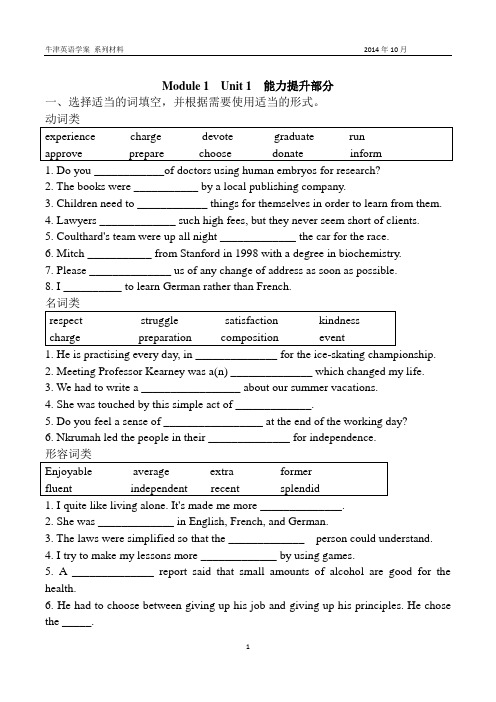
牛津英语学案系列材料2014年10月Module 1 Unit 1 能力提升部分一、选择适当的词填空,并根据需要使用适当的形式。
1. Do you ____________of doctors using human embryos for research?2. The books were ___________ by a local publishing company.3. Children need to ____________ things for themselves in order to learn from them.4. Lawyers _____________ such high fees, but they never seem short of clients.5. Coulthard's team were up all night _____________ the car for the race.6. Mitch ___________ from Stanford in 1998 with a degree in biochemistry.7. Please ______________ us of any change of address as soon as possible.8. I __________ to learn German rather than French.1. He is practising every day, in ______________ for the ice-skating championship.2. Meeting Professor Kearney was a(n) ______________ which changed my life.3. We had to write a _________________ about our summer vacations.4. She was touched by this simple act of _____________.5. Do you feel a sense of _________________ at the end of the working day?6. Nkrumah led the people in their ______________ for independence.1. I quite like living alone. It's made me more ______________.2. She was _____________ in English, French, and German.3. The laws were simplified so that the _____________ person could understand.4. I try to make my lessons more _____________ by using games.5. A ______________ report said that small amounts of alcohol are good for the health.6. He had to choose between giving up his job and giving up his principles. He chose the _____.1。
Module 1 My first Day at senior High教学设计优秀4篇
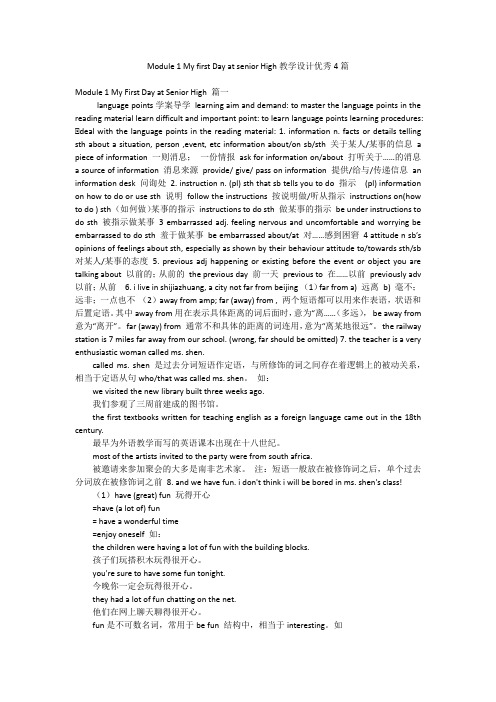
Module 1 My first Day at senior High教学设计优秀4篇Module 1 My First Day at Senior High 篇一language points学案导学learning aim and demand: to master the language points in the reading material learn difficult and important point: to learn language points learning procedures: ⅰdeal with the language points in the reading material: 1. information n. facts or details telling sth about a situation, person ,event, etc information about/on sb/sth 关于某人/某事的信息a piece of information 一则消息;一份情报ask for information on/about 打听关于……的消息a source of information 消息来源provide/ give/ pass on information 提供/给与/传递信息an information desk 问询处2. instruction n. (pl) sth that sb tells you to do 指示(pl) information on how to do or use sth 说明follow the instructions 按说明做/听从指示instructions on(how to do ) sth (如何做)某事的指示instructions to do sth 做某事的指示be under instructions to do sth 被指示做某事3 embarrassed adj. feeling nervous and uncomfortable and worrying be embarrassed to do sth 羞于做某事be embarrassed about/at 对……感到困窘4 attitude n sb’s opinions of feelings about sth, especially as shown by their behaviour attitude to/towards sth/sb 对某人/某事的态度5. previous adj happening or existing before the event or object you are talking about 以前的;从前的the previous day 前一天previous to 在……以前previously adv 以前;从前 6. i live in shijiazhuang, a city not far from beijing (1)far from a) 远离b) 毫不;远非;一点也不(2)away from amp; far (away) from , 两个短语都可以用来作表语,状语和后置定语。
Module 1 学案
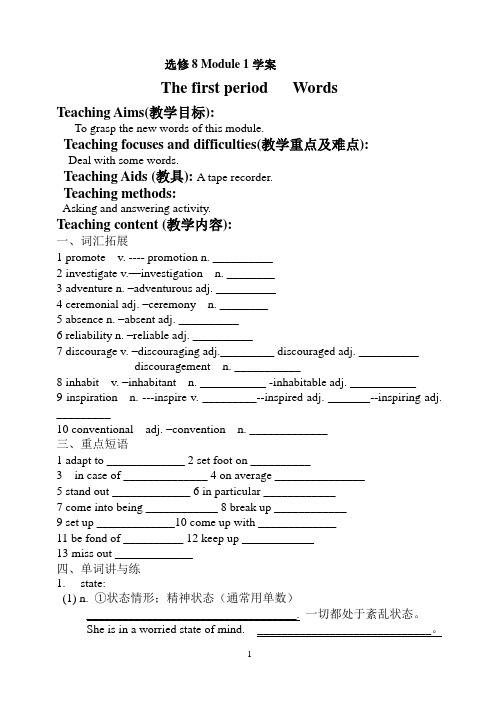
选修8 Module 1学案The first period WordsTeaching Aims(教学目标):To grasp the new words of this module.Teaching focuses and difficulties(教学重点及难点):Deal with some words.Teaching Aids (教具): A tape recorder.Teaching methods:Asking and answering activity.Teaching content (教学内容):一、词汇拓展1 promote v. ---- promotion n. __________2 investigate v.—investigation n. ________3 adventure n. –adventurous adj. __________4 ceremonial adj. –ceremony n. ________5 absence n. –absent adj. __________6 reliability n. –reliable adj. __________7 discourage v. –discouraging adj._________ discouraged adj. __________discouragement n. ___________8 inhabit v. –inhabitant n. ___________ -inhabitable adj. ___________9 inspiration n. ---inspire v. _________--inspired adj. _______--inspiring adj. _________10 conventional adj. –convention n. _____________三、重点短语1 adapt to _____________2 set foot on __________3 in case of ______________4 on average _______________5 stand out _____________6 in particular ____________7 come into being ____________ 8 break up ____________9 set up _____________10 come up with _____________11 be fond of __________ 12 keep up ____________13 miss out _____________四、单词讲与练1.state:(1) n. ①状态情形;精神状态(通常用单数)___________________________________. 一切都处于紊乱状态。
外研版七年级英语上册Modules1~5(含Starter)复习学案设计(无答案)

外研版七年级英语上册Modules 1〜5(含Starter)复习学案设计(无答案)七年级上册Modules 1〜5(含Starter)【复习目标】话题:☆人物介绍☆家庭介绍☆学校生活语法:☆基数词☆ be动词的用法☆指示代词的用法☆名词的用法☆ there be句型☆介词或介词短语表示方位【基础巩固】默写下列单词和短语Module 1 —4(含Starltr modules)L ___ (proib)R (ift、f___ (宾ft J f_____性物主代词)* (名词性物主代词)2.___ 〔firon t)你(主需)f _二(形容词性物主代词)二性厠孫词}3._____ £W遇见.结识・171&〔宾加一:(名词!厂---- I I C (眦)谢谢-* ____________ I动词)f汀&________ Qdj.}感救的■感谢的—“刖门这个,这-____________ (pl.[这些〜:囤_______ {对应MX pron. ) l;f个f ___ (p! ): 那墜: JO6.____ (认)看见f(过去号词)7._____ @(过去分词)K-____ 帮助-(过去式)■*}小的7 ____ (反丈词)be//.)大的•大号的Mmluk 2_______ 5 }男警臬十___________ (pL )f_______ 5*)(集台若诃}習蔡_________ <畋)坤腔员.可机f ___________ (认)鴛虬骂牟Module 3__________ (机}国书博-*______________ t pL'f 5〕圏书管理示H3__________ (血[科学■科学课十________ __(n.)科学家________ <加匚)崖正地泮常我Module 4_________ 眄)饮料囲SdjJ许茅的•大量的f £比21.=2N3石"有㈱助的?j 23.____ (过去式)f \21•过去式)亠较缎[电娄的一________ (最鳥级)杲參的(认)知道•俺那*.(过去分词)■S)颜色►_10. ______的•生动的11. ________仏)生日- ____________佃*)出生.血疑12・(时.」最畀丽£H>b»duk I11_______ <n- &叔八沖国人点诵:中国的冲国人的f 6.)中禺[33IL (7?T adj.)SS人,奂洲人:莫国的•夷再人的•美洲的-______________ (几)姜Ph 关洲________ (忒)号铃尊,土豆十___________ (pL >________ 〔n.)WfE 柿、番茄-* _______ £ pL)______ (nJ(ll岁以下的}小核一儿量〜26.27.:28.:30.________ g )牙皆-*______W)陞両高轲_______ 佔•、廉的•不好的〜_____________ f比较级'更坏/羞的" ___________ f:最髙冕i最坏/荒的_____________ (心[重要的十___________________ (».)重腔性:第亜_________ 4.)记井•毎起【重点梳理】小组内进行知识归纳讲解并运用练习。
四年级上册英语(外研版)第一模块导学案
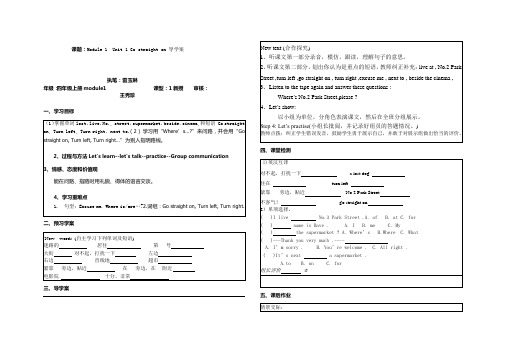
课题:Module 1 Unit 1 Go straight on 导学案年级:四年级上册module1 执笔:雷玉琳王秀珍课型:1新授审核:一、学习目标(1)掌握单词lost,live,No., street,supermarket,beside,cinema,和短语 Go straight on, Turn left, Turn right,next to.( 2 ) 学习用“Where’s…?”来问路,并会用“Go straight on, Turn left, Turn right…”为别人指明路线。
2、过程与方法Let`s learn--let`s talk--practice--Group communication3、情感、态度和价值观能在问路、指路时用礼貌、得体的语言交谈。
4、学习重难点1. 句型:Excuse me. Where is/are…?2.词组:Go straight on, Turn left, Turn right.二、预习学案.New words .(自主学习下列单词及短语)迷路的居住第......号大街对不起,打扰一下左边右边直线地超市紧靠......旁边,贴近在......旁边,在.....附近电影院十分,非常三、导学案New text (合作探究)1、听课文第一部分录音,模仿,跟读,理解句子的意思。
2、听课文第二部分,划出你认为是重点的短语,教师纠正补充:live at , No.2 Park Street ,turn left ,go straight on , turn right ,excuse me , next to , beside the cinema ,3、Listen to the tape again and answer these questions :Where’s No.2 Park Street,please ?4、Let’s show:以小组为单位,分角色表演课文,然后在全班分组展示。
Module1Unit1复习学案(译林牛津版高一英语必修二教案教学设计)
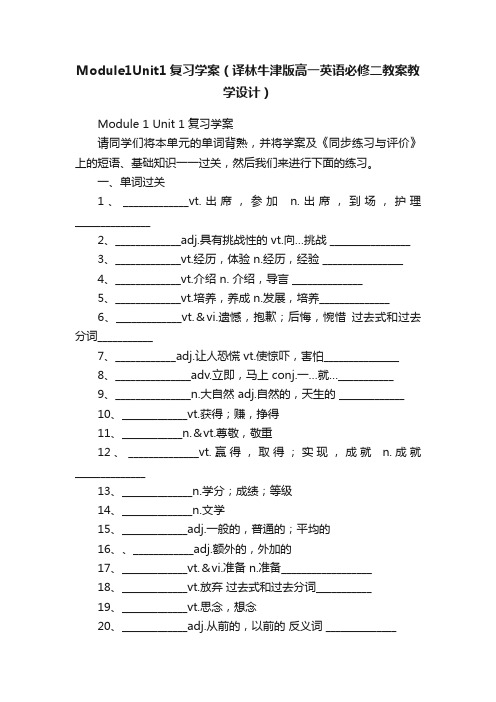
Module1Unit1复习学案(译林牛津版高一英语必修二教案教学设计)Module 1 Unit 1 复习学案请同学们将本单元的单词背熟,并将学案及《同步练习与评价》上的短语、基础知识一一过关,然后我们来进行下面的练习。
一、单词过关1、_____________vt.出席,参加n.出席,到场,护理_______________2、_____________adj.具有挑战性的 vt.向…挑战 ________________3、_____________vt.经历,体验 n.经历,经验 ________________4、_____________vt.介绍 n. 介绍,导言 ______________5、_____________vt.培养,养成 n.发展,培养______________6、_____________vt.&vi.遗憾,抱歉;后悔,惋惜过去式和过去分词___________7、____________adj.让人恐慌 vt.使惊吓,害怕_______________8、_______________adv.立即,马上 conj.一…就…___________9、_______________n.大自然 adj.自然的,天生的 _____________10、_____________vt.获得;赚,挣得11、____________n.&vt.尊敬,敬重12、______________vt.赢得,取得;实现,成就n.成就______________13、______________n.学分;成绩;等级14、______________n.文学15、_____________adj.一般的,普通的;平均的16、、____________adj.额外的,外加的17、_____________vt.&vi.准备 n.准备__________________18、_____________vt.放弃过去式和过去分词___________19、_____________vt.思念,想念20、_____________adj.从前的,以前的反义词 ______________21、_____________n.文化 adj. 文化的 _______________22、_____________vt.捐赠;赠予 n. 捐赠物________________23、_____________vt.陈列,展览24、_____________ vt.&vi.批准,通过;赞成25、_____________集会n. 26、_____________ 甜点n.27、_____________最近adv. 28、_____________ 远足n. 29、___ 善举n. 30、 ___演说n.31、 ___ 朝代n. 32、 ___通知,告知v.二、短语过关(一)介词填空1._________free 免费2 .pay attention_____ 注意3 .inform sb _______sth 通知某人某事4. know_______ 了解5. ______the first day 在第一天6.earn respect________ 赢得尊敬7. _______lunchtime 在午饭时候8. ______the school field 在学校操场上9. ________average 平均10. according________ 根据11. be available ________ 可以用来做某事12 equip______ 装备13.____finishing one’s studies 一完成学业就14. develop an interest________ 培养兴趣15. refer ________ 指代参考提到16.relate__________ 与---相关17. _______short form 用简写形式18. be responsible _______ 对…负责19.consist _________ 由…组成e up_______ 想出21. give suggestions_________给予建议22. ______the end of the school year在学年结束时23. ______school assembly在校会上24. ________ the school entrance (to) 在学校入口处25.be late_____ my appointment ______sb约会晚点26.leave _______ 删除27. ________ this case 在这种情况下pare….______ 把……同……作比较29.show respect ______sb 尊敬某人30.sit next ______ sb 坐某人旁边31.be _____ ease ______our foreign teacher 和外教轻松相处32.be happy ______the school life = be pleased _______ the school life 对学校生活很满意33._________ other words 换句话说34.find my way _________找到出路35.sign _________ 签名36.give/make a speech _______ 作关于…的演讲37.word _______word 逐词地38. _________the year终年39.move to different classrooms ______ different classes去不同的教室上不同的课40.a bit challenging ________sb 对某人来说有点挑战性41.a library _______over 18,000 books 有18,000多藏书的图书馆42. _________ campus 在校园里43.read aloud = read sth _________ loud高声读出44.be confident _________sth 对…有信心45.base …_________…/ be based _______ … 以…为基础(二)动词填空1.自我介绍__________oneself to2.上网 ___________the internet3.参加集会___________assembly4.获得高分___________high grades5.作出决定___________a decision6.经营一个饭店 ________a restaurant7.创办一个书店 _________a bookstore8备课_________one’s lesson9.赞成这个想法 ________ofthe idea10.听彼此谈论诗歌 listen to each other ________about poems11.让大家围绕一棵古树坐着________ everyone around an old tree12.讨论你的日常校园生活 ________ your daily school life13.比较信息 __________ information13. 写一个通知 __________a notice14. 设计海报 __________ a poster15. 体验不同的生活方式 ___________ different ways of life16. 给你家人发电子邮件 __________your family17. 一直往前走 __________ straight on18. 住的离家很远 __________ far away from home19. 放弃某些科目 __________ some subjects20. 了解……的中心意思 __________ a general idea about / of sth.21. 用其他东西与某物搭配 __________sth. with sth. else22. 把某物捐献给某人 _________sth. to sb.23. 参考 _________to24. 删除 _________out25. 从……毕业 _________ from26. 有了做某事的兴趣 _________an interest in _______sth.27. 一完成学业(就……) upon _______ his studies28. 把……同……作比较________….with…29. 把某事通知某人 ________sb. of sth30. 每天花一个小时的时间在图书馆读英语书______an hour each day________ English books in the library31. 在树下放松 _________under a tree(三)重要短语及知识拓展(读读、背背)1.do sth out of the respect of our teacher 出于对老师的尊敬而做某事2.show respect for __________________3. achieve success/one’s goal ______________4.for freeo ______________5.drop out 中途退出6. miss doing sth 错过做..miss being punished by the teacher 逃过老师惩罚miss the chance to go abroad for further education 错过出国深造的机会miss talking with my mother 想念和妈妈的谈话7.run a company/school/hospital经营/管理________8.have much experience in ___________9.introduce sb to…(be introduced to)10.the former…the latter前者…后者11.have a gift for..在某一方面有天赋12.donate sth to sb/sp ______________13.give (sb) a speech ______________14.on display 在展出15.be pleased with 对…满意16.approve of… 批准…17.go outing ______________18.in nature ______________19.not a bit = not at all 一点儿也不 not a little = much 非常 a little bit 一点….20.set sb a good example 为某人树立好榜样take sth for example = take sth as an example 拿……来举例21. in a word 简而言之keep one’s word 守信break one’s word 违背诺言in one’s own words 用自己的话have words with sb 和某人吵架have a word with sb = have a few words with sb 与某人交谈22.would like to do sth = feel like doing sth 想要做某事would like to have done 本来想做的但没做23.meet/ one’s needs/demands/requirements = satisfy the needs/demands…. 满足需要24. compare sth with 把…和…相比较 compare sth to把…和…相比较,把…比作…make comparisons 作比较in comparison with 与…相比25.regret doing= regret having done 后悔做了某事/regret to do 抱歉要…26. inform sb of sth→be informed of sth; inform sb that +从句inform sb of the meeting 提醒他开会be informed of sth. 对…..了解well-informed消息灵通的27.under discussion 在讨论中/under construction 在建设中/under consideration 在考虑中28. be disappointed at the result 对结果失望to my disappointment 失望的是much to one’s disappointment =to my great disappointment29. at ease: 安逸,自在 with ease=easily uneasy: 心神不安的, 不自在的30 .be used to do sth:被用来做… be/get used to sth / doing sth:习惯于做…used to do sth: (过去)常常做… There used to be…(以前有…)31.pay attention to doing sth (to为介词) look forward to doing sth32. prepare lessons/supper(备课/烧饭)prepare for the coming examprepare sb for sthbe (well/poorly) prepared for sth: 为…作好了准备make preparations for sth=prepare for sthin preparation for…为...准备33.develop an interest in; develop a good habit (培养/养成)34. require sb to do sth→be required to do sth ___________________require that…(should) do sth _______________________require sth of sb _________________________We did all that was required of us.35.act in a play/film; act the part of Zhou Enlai ; act as:作为/充当36.give sb some advice(不可数)on…_____________ask (sb) for advice ______________take/follow one’s advicemake some suggestions(可数) ______________37.be present at a meeting/a party出席/参加the people present:在场的人三、重点知识点、句型整合(再次强调)1. do用来加强语气“的确/确实”, 有时态变化,其后接动词原形。
英语学案.doc Module1 U3 语法课

(
(
C. last
(
(
(
四、完成句子 1、你来自何方? ___________ are you ___________? 2、我今年十三岁。 I’m ___________ __________ old. 3、他们是好朋友。 They _________ __________ __________ . 4、她姓张。 His _________ __________ is Zhang .
(
C. America
(
2
Module 1 Unit 3
( A.a B. an C. the )6. —_______ is your grandmother? —She is over eighty years old. A. How old B. How many C. Where )7. My mother works in a hospital, _________ works very hard. A. she B. her )8. David Beckham’s _________ name is David. A. given )9. What’s this B. family Chinese? C. I
习
5. Daming’s father _______ 46 years old . 6. What ________ these ? They _______ apples .
1
Module 1 Unit 3
7. ________ their friends English ?
8. There ________ many students in the park. 9. What _________ your favourite food? 二、单词拼写( 1. It’s very nice to _________
外研社初二英语Module1复习学案

八年级Module1复习学案一.短语:收拾占用一直,总是对……感兴趣山地自行车运动并且,还比如出版结果一种。
的收集五六十集邮拉小提琴一些。
另一些下次接受采访照顾在将来一些新东西在……结束时在过去不仅……而且高中二.语法:1.a bit+形容词/ a bit of+名词/ a little+不可数名词/形容词例:It’s _______________untidy, please tidy it up.There is ____ water, you can drink.2.对…感兴趣例:我对打排球很感兴趣。
3.听某人干某事听见某人做某事例:我经常听他读英语。
我昨晚听见他正在拉小提琴。
4.bring用法:例:音乐把你带到了中国。
5.需要做某事:例:玲玲需要整理他的房间,因为它有点乱。
6.使某人干某事:使。
怎么样:例:爱好能使我们成长。
这件事使爸爸很生气。
7.比如,例如()区别{()8.要求/请求某人做某事例:她经常要求我们不要忘记写作。
9.尽力做某事尝试做某事例:我们应该尽力做一些新鲜或不同的事情。
10.花费。
(写出用法)(1)(2)(3)(4)例:他花了两个小时完成了作业。
我买这张火车票花了十美元。
11.擅长做某事,在。
方面做得好例:我擅长唱歌还有跳舞。
12.不仅……而且……他们不仅享受了生活,而且学习了技能。
不仅你而且他也知道答案。
13.成功(名词)(形容词) (动词)高兴(动词)(名词)Teenage(名词)_____________ use(形容词)______________发展(动词)(名词)发展中的______________ 发达的__________________三.句子背诵。
1.我经常听他拉小提琴。
2. 音乐把你带到了中国。
3.爱好能够是你成长,发展你的兴趣,并且帮你学习新技能。
4.他要求我们想像我们在故事之中。
5.他的爱好是写作。
6.David很幸运因为他的爱好给他带来了快乐和成功。
外研版八年级英语上册Module1精品复习学案及测试题【精 自己家教用】

M 1 精品复习学案Module 1 How to learn English【学习】一、词形1.translate (v) → translation (n) →translator (n,人)2. pronunciation (n) →pronounce (v)3.writing(n) →write(v)→writer(n人)4. spelling(n) →spell(v)5. advice(n) →advise(v)6.yourself (pron) →yourselves (pl. p ron)7. deep(adj) →deeply(adv)8. breath(n) →breathe(v)9. remember(v) →反义词forget(v)10. all the time →同义词always 11. borrow(v) →反义词lend(v) 12. send(v)→过去式sent→过去分词sent 13. hear(v)→过去式heard→过去分词heard 14. correct (adj/v)→反义词wrong (adj) 15. friend (n)→形容词friendly 16. ask (v)→反义词answer(v) 17. else→同义词other二、短语与句型1、怎样学英语:how to learn English→表示“怎样做某事”可以用how to +V原形2、尽量不要逐词翻译:try not to translate every word→表示“尽量做(不做)某事”用try (not) to +V原形。
表示“尝试做某事”用try + V+ing的形式3、给你一些建议:give you some advice→表示“给某人某物”用give sb sth或者give sth to sb来表示;advice 是不可数名词4、你为什么不把它写下来?:Why don't you write it down?→表示:"为什么不做某事"用"Why don't you +V原形"或者"Why not +V原形"表示;write down 的宾语如果是代词一定要放在中间5、还有别的什么?:What else?=What other things?→ else 一般要放在不定代词,如:somebody, something, anybody, anything等,或者疑问代词,如:what,who等的后边,表示其他的人或物。
module1《hobbies》学案(外研版初二下)
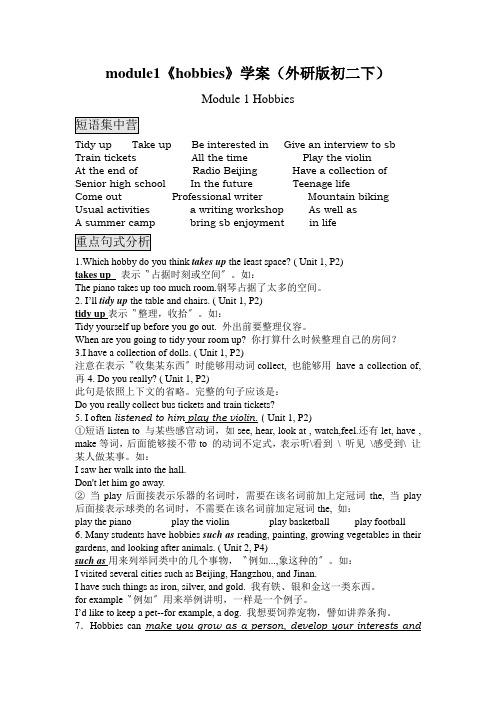
module1《hobbies》学案(外研版初二下)Module 1 HobbiesTidy up Take up Be interested in Give an interview to sb Train tickets All the time Play the violinAt the end of Radio Beijing Have a collection of Senior high school In the future Teenage lifeCome out Professional writer Mountain biking Usual activities a writing workshop As well asA summer camp bring sb enjoyment in life1.Which hobby do you think takes up the least space? ( Unit 1, P2)takes up表示〝占据时刻或空间〞。
如:The piano takes up too much room.钢琴占据了太多的空间。
2. I’ll tidy up the table and chairs. ( Unit 1, P2)tidy up表示〝整理,收拾〞。
如:Tidy yourself up before you go out. 外出前要整理仪容。
When are you going to tidy your room up? 你打算什么时候整理自己的房间?3.I have a collection of dolls. ( Unit 1, P2)注意在表示〝收集某东西〞时能够用动词collect, 也能够用have a collection of,再4. Do you really? ( Unit 1, P2)此句是依照上下文的省略。
完整的句子应该是:Do you really collect bus tickets and train tickets?5. I often listened to him play the violin. ( Unit 1, P2)①短语listen to 与某些感官动词,如see, hear, look at , watch,feel.还有let, have , make等词,后面能够接不带to 的动词不定式,表示听\看到\ 听见\感受到\ 让某人做某事。
Module1Unit1学案初中英语七年级下册

Module 1 Unit 1Whose bag is this?【学习目标】1.能够正确使用名词性物主代词询问或表示物体的所属关系;能够读懂有关失物招领的文章,理解语篇主题和细节;能写简单的失物招领启事。
2.通过听力训练、对话练习、写作练习等方式展开自主学习。
3.培养乐于助人、拾金不昧、礼貌待人的优良品质。
◎课时重点:1.能运用whose引导的句型讨论和询问物体的所属关系。
2.初步理解名词性物主代词的运用。
【预习导学】一、填一填1.失物招领箱_______2.从现在起_______3.首先_______4.来看看_______5.许多_______6.注意;小心_______二、译一译1.各位,欢迎返校!_______2.这足球是Tony的吗?_______3.这是紫色钱包!_______4.这些是谁的手套?_______三、想一想1.形容词性物主代词有哪些?_______2.名词性物主代词有哪些?_______3.whose的用法是怎样的?_______【答案】预习导学一、1.lost and found box2.from now on3.first of all4 e and look5.a lot of/lots of6.be careful with二、1.Wele back to school, everyone!2.Is the football Tony's?3.Here's a purple wallet!4.Whose gloves are these?三、1.my, your, his, her, its, our, their2.mine, yours, his, hers, its, ours, theirs3.对物主代词或名词所有格提问用whose。
【合作探究】任务驱动一听力练习1.听课本第3部分的录音,按照你所听到的内容的先后顺序,给下面方框中的单词标出序号。
- 1、下载文档前请自行甄别文档内容的完整性,平台不提供额外的编辑、内容补充、找答案等附加服务。
- 2、"仅部分预览"的文档,不可在线预览部分如存在完整性等问题,可反馈申请退款(可完整预览的文档不适用该条件!)。
- 3、如文档侵犯您的权益,请联系客服反馈,我们会尽快为您处理(人工客服工作时间:9:00-18:30)。
I. Key phrases1. report sth. to sb.向…汇报…2. be happy with…对…满意ter than usual 比平时迟4.attend an assembly 参加会议5.the best way to do/of doing做…最好的方法6.devote oneself to…致力于…7.sound like (a good idea)听起来…8.on average平均9.spend time doing…花时间做…10.send e-mails to sb.给…发邮件11.at the end of…在…末端12.be fond of …喜欢13.stop doing…停止做…14.look back on…回顾municate with…和…交流16.choose to do….选择做…17.surf the Internet上网18.be/get used to doing习惯于…19.plan on doing/plan todo…计划做…20.instead of …代替21.(be) available (for …) …可得到,可用22.upon/on doing …一…就….23.develop an interest in…对…感兴趣24.for one thing 一方面for another thing 另一方面25.make good use of …充分利用26.make decisions作决定27.finish doing…完成做…28.regret to do (say/tell/inform…)…/遗憾地去…regret doing后悔做了…rm … of …/that …通知30.in charge of 负责,掌管31.more than 不仅仅32.for free免费33.require sb to do要求某人做...34.according to 根据35. present sth. to sb.把…呈现给…II. Key sentences1.Going to a British high school for one year was a very enjoyable and exciting experience for me.(P2 L1-2)2. Though it didn’t look very beautiful when it was finished, I still liked it very much.(P3L40-41)3. During exam time we have a special programme that tells students the things they should do for preparation.4. When parents come to visit the school and talk to the teachers, we often pay songs sung by students, and we also give messages to inform the parents of events such as outings and school plays.III. Multiple choice1. We regret ______ you that our library will be closed next Wednesday.A. informingB. to informC. having informedD. to have informed2. Upon________ the news, he jumped with joy.A. he heardB. heard C.he was hearing D. hearing3. The manager of the hotel told him that he could have breakfast there ______.A. on freeB. for freeC. in freeD.with free4. All the moey, foods and clothes have been ______ to the poor people.A. attendedB.displayedC. introducedD. donated5. I remembered ______ the letter along but forgot ______ it.A. taking; to postB. taking; postingC. to take; to postD. to take; posting6. ______ to Beijing, they began to organize a meeting to discuss the new plan.A. To returnB. Upon returningC. ReturnedD. Return7. Listen! ______ the music sounds!A. How sweetlyB. How sweetC. What sweetD. What sweetly8. Mr. Robert is _____ our teacher. He is also a friend.A. more thanB. no less thanC. no more thanD. less than9. Hearing his travelling _______, I knew that he was an _____ traveller.A. experiences; experiencedB. experience: experienceC. experiences ;experiencingD. experience; experienced10. The teacher required the students ______ their homework on time.A. to hand inB. hands inC. handing inD. handed in11. Students used to _____ information from newspapers or magazines, but now they are used to ___ for it on the Internet directly..A. get; searchB. getting; searchC. get; searchingD. getting; searching12. ________it is to jump into a river on a hot summer day!A.How fun B.What a fun C.What fun D.How a fun13. Is _____possible ____us to master a foreign language without much memory work?A.it; of B.that; of C.that; for D.it; for14. _____ the whole school safer and more pleasant is an important part of school development.A. MakeB. MadeC. MakingD. Makes15. As we are good friends, please ______ us___ whatever you need.A. inform; aboutB. inform; ofC. inform; onD.both A and B16. John was ___ the company while the manager was on holiday.A . in charge of B. in need of C. in case of D. in search of17. Most people enjoy receiving letters , but few seem to be very _____ writing them.A. fond ofB. afraid ofC. tired ofD. full of18. I like to ______ my junior high school days, which were the happiest in my life.A. look out ofB. look back onC. look upD. look down on19. You must ______ any chance to practise speaking English.A. make use ofB. make useC. make use forD. make use to20. Before going on a trip, we need to make some ________.A. generationsB. satisfactionC. preparationsD. operations根据汉语写短语:1. 向…汇报…______________2. 对…满意______________35.比平时迟______________36.参加会议______________37.做…最好的方法______________38.致力于…______________39.听起来…______________40.平均______________41.花时间做…______________42.给…发邮件______________43.在…末端______________44.喜欢______________45.停止做…______________46.回顾______________47.和…交流______________48.选择做…______________49.上网______________50.习惯于…______________51.计划做…______________52.instead of …代替______________53.可得到,可用______________54.一…就….______________55.对…感兴趣______________56.一方面______________另一方面______________57.充分利用______________58.作决定______________59.完成做…______________60.遗憾地去…______________后悔做了…______________61.通知______________62.负责,掌管______________63.不仅仅______________64.免费______________65.要求某人做... ______________66.根据______________ 35. 把…呈现给…______________。
